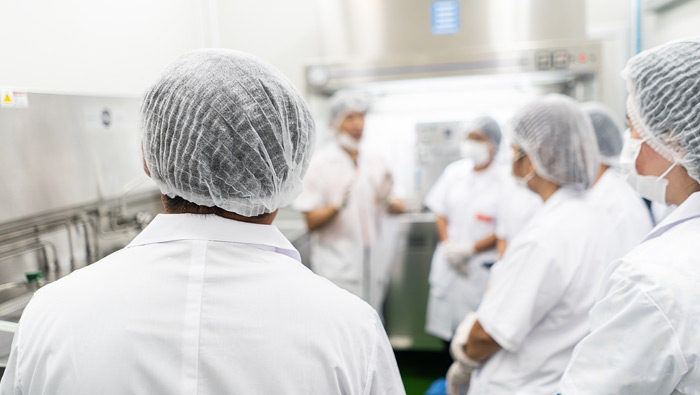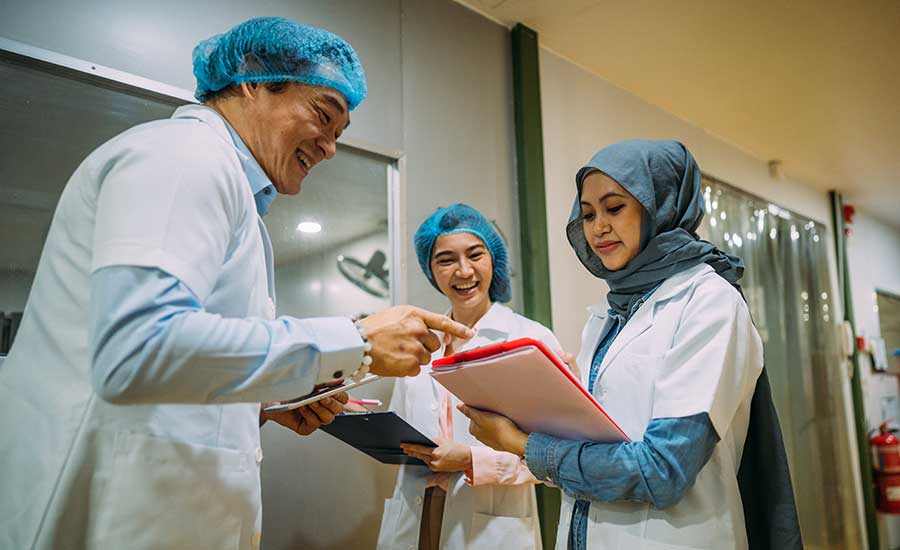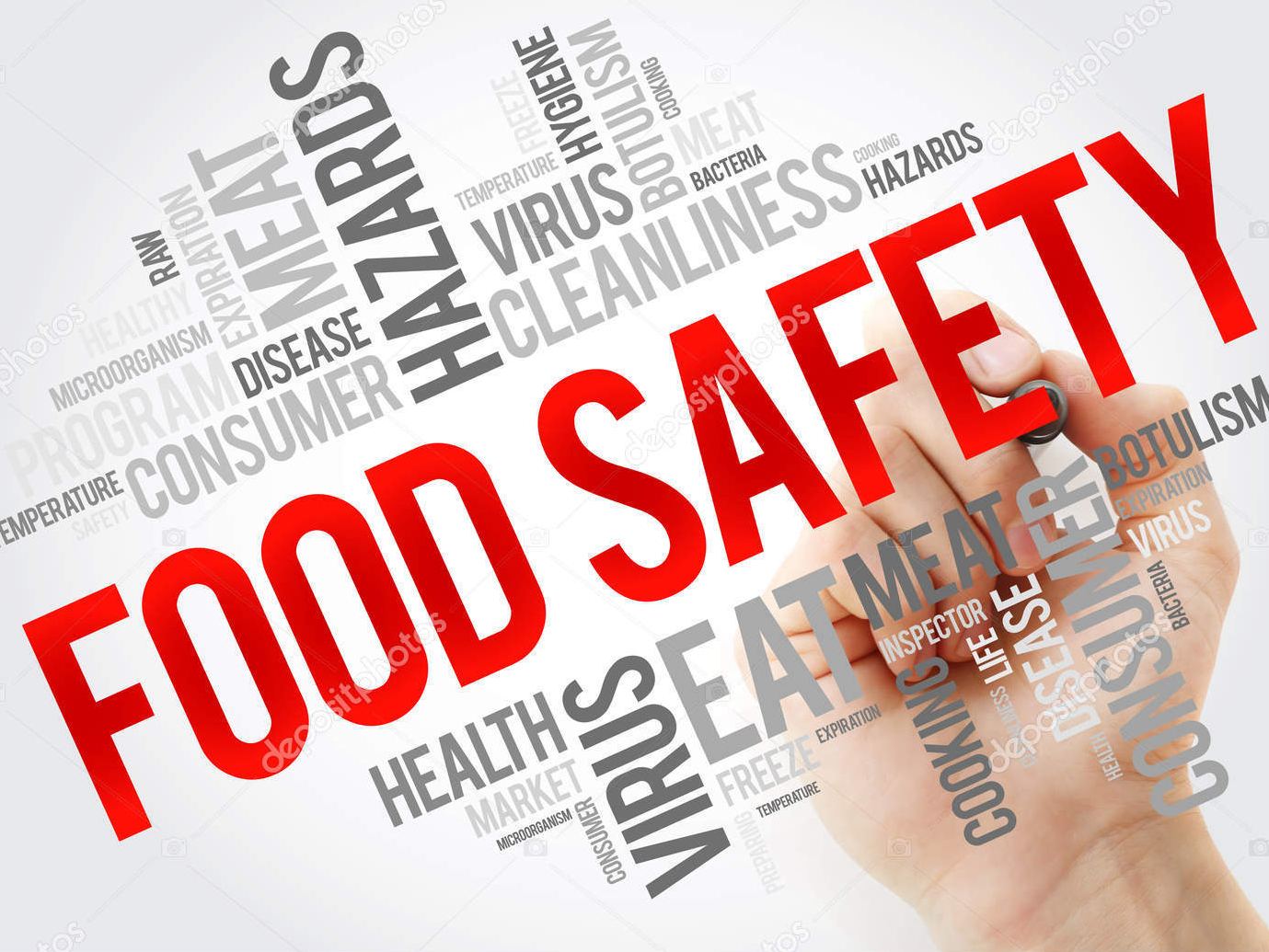スナック菓子メーカーにとって、食品の安全性を確保することは常に最優先事項です。消費者に安全で高品質なスナック菓子を提供するためには、スナック菓子の製造工程における食品の安全性を維持することが非常に重要であることを私たちは理解しています。 幸運のフルーツ スナック製品の品質管理を重視し、FDA、HACCP、ISO22000の品質安全管理システム認証を取得し、これらの管理システムを実施し、風味がよく、食品安全が保証されたチョコレートスナックやナッツスナックの製造に取り組んでいる。



食品を汚染から守り、費用のかかる製品回収を防ぐために、多くの政府機関や民間団体が食品安全ガイドラインを定めています。このブログでは、FDAが定めた指針や、スナック菓子製造における食品安全プロセスを効果的に実施するための方法について説明します。これらのガイドラインやヒントに従うことで、食品工場が製造する食品の安全性を確保することができます!
製造業の食品安全とは何か?
製造過程における食品安全とは、食品が食用として安全であることを保証するプロセスである。このプロセスには、食品が細菌、ウイルス、または毒素で汚染された場合に発生する食中毒の予防が含まれる。製造過程における食品安全には、食品が汚染されていないこと、つまり有害な成分や未申告の成分が含まれていないことを保証することも含まれる。
製造業において食品安全を維持するためには、組織内の協力が鍵となる。食品安全プロセスでは、受け入れ部門から流通部門に至るまで、全員が役割を担っている。したがって、食品製造に携わる全員が食品安全手順を理解し、それに従うことを約束しなければならない。
食品製造の各段階における準備も、製造中の食品安全にとって極めて重要である。これには、清潔な調理器具の使用や定期的な器具の洗浄、清潔に処理された原材料の使用、食品の正しい保管など、食品汚染を防ぐための予防措置が含まれる。

食品安全ガイドライン
政府や民間団体が定めた食品安全ガイドラインは数多くある。FDAが定めた食品安全ガイドラインは、食品製造において従うべき最も重要なガイドラインの一部である。その他の食品安全ガイドラインには、世界保健機関(WHO)、米国農務省、民間の食品安全認証機関が策定したものがある。
スナック菓子メーカーを支援するため、これらの食品規制機関は効果的な食品安全規制と基準を提供している。これらには以下が含まれる:
清潔さと衛生
毎日、作業者の手は様々な微生物で汚染されている。これらの微生物は、食品接触面が適切に洗浄・消毒されない場合、食品を汚染する可能性がある。これを防ぐためには、以下のような適切な衛生管理が必要である:
- 食品の準備や取り扱いの前後には、必ず手を洗う。
- 使用前と使用後は、表面と器具を熱い石鹸水で洗浄し、消毒する。
- 新鮮な食材を冷水で洗う。
汚染を避けるため、すべての食品調理・製造エリアには、昆虫やその他の動物などの害虫がいないことが望ましい。
きれいな水と厳選された原材料を使用
水や氷には有害な微生物や化学物質が含まれていることがあります。原材料を注意深く選び、食品を調理する前に水の安全性を確認するなどの簡単なステップを踏むことで、これを軽減することができます。以下は、水の安全性を確保する際に考慮できるヒントです:
- ろ過、煮沸、塩素消毒。
- 虫の繁殖を防ぐため、水槽やその他の容器にネットをかぶせる。

品質検査
品質チェックは、原材料から最終製品に至るまで、スナック食品製造の全プロセスを通じて実施されるべきである。これにより、食中毒の危険性が全ての段階で特定され、管理されることになる。これを効果的に行うために、スナック菓子メーカーは食品安全マネジメントシステム(FSMS)を導入する必要がある。食品安全マネジメントシステムとは、スナック菓子メーカーが食品の安全性を確保するために使用する一連のプロセスと手順のことである。これには、食品安全要件の定義、食品安全管理の実施、食品安全手順のモニタリングが含まれる。
製造食品安全プロセス導入のヒント
ここでは、製造施設で食品安全プロセスを効果的に実施するためのヒントをいくつか紹介する:
食品安全チームの設立
食品安全チームを作ることは、製造施設に食品安全プロセスを導入するための優れた第一歩である。食品安全チームは、食品安全管理システムの開発と監督に責任を持つべきである。
食品安全チームは、製造、品質管理、食品安全など、組織内の様々な部門の代表者で構成されるべきである。そうすることで、食品安全が組織全体で重視され、集中されることになる。

食品安全手順について従業員を教育する
食品安全手順について従業員を教育する。従業員が最新の食品安全手順を習得できるよう、定期的なトレーニ ングを実施する。従業員は、食品安全上の危険とその管理方法を理解すべきである。また、食品安全インシデントが発生した場合の対応方法も知っておくべきである。定期的な食品安全監査を実施し、従業員が食品安全手順に従っている ことを確認する。
食品安全手順を定期的に監視する
適切なコンプライアンスを確保するためには、食品安全手順の定期的 なモニタリングが重要である。食品安全監査は定期的に実施し、食品安全手順が遵守され ていない領域を特定すべきである。さらに、食品安全記録が定期的に見直され、食品安全手順が守られ ていることが確認される。
影響を監視し、実施を見直す
食品安全プロセスが組織に与える影響をモニタリングすることは極めて重要である。これは、食品安全手順が守られていない領域を特定するのに役立つ。食品安全チームは、食品安全マネジメントシステムの正しさと合理性を定期的に見直し、必要な修正を加えるべきである。
継続的改善目標
食品安全プロセスの継続的改善は重要である。そのためには、食品安全マネジメント・システムを継続的に見直し、更新する必要がある。さらに、定期的な食品安全監査を実施し、食品安全手順を改善できる分野を特定する必要がある。

よくある質問
Q1:食品衛生上の危害とは何ですか?
食品安全ハザードとは、消費者に危害を及ぼす可能性のある食品中の生物学的、化学的、物理的要因のことである。生物学的ハザードには、細菌、ウイルス、寄生虫などの微生物が含まれる。化学的ハザードは、農薬、食品添加物、毒素などの汚染物質である。物理的ハザードとは、ガラス片や金属片など、食品を汚染する可能性のある異物を指す。
Q2: クロスコンタミネーションは、製造工程における食品安全にどのような影響を与えますか?
交差汚染は、有害な細菌や物質がある食品から別の食品に移ることで起こる。これは通常、食品同士の直接接触、または同じ表面や器具を使用することで発生する。製造業では、交差汚染が食中毒の蔓延につながる可能性があるため、交差汚染の防止は極めて重要である。
Q3: 食品安全に関するHACCPの原則とは何ですか?
HACCP(Hazard Analysis and Critical Control Points:危害分析重要管理点)は、食品安全予防のための体系的なアプローチであり、最終製品を安全でなくする可能性のある製造工程中の物理的、アレルギー誘発性、化学的、生物学的危害を特定するものである。食品製造工程における重要なポイントを管理することにより、これらのリスクを安全なレベルまで低減するための対策を概説している。
Q4:なぜトレーサビリティが食品安全にとって重要なのですか?
食品安全トレーサビリティとは、あらゆる食品を生産、加工、流通の全段階を通じて追跡できる能力のことである。原材料、添加物、包装などのすべての食品投入物の出所を特定することは極めて重要である。これにより、食品安全上の問題が発生した場合、製品を効果的に回収し、消費者へのリスクと企業への財務的影響を最小限に抑えることができる。
Q5:製造食品安全トレーニングはどれくらいの頻度で実施すべきですか?
食品安全トレーニングは、ガイドラインや規制が変更される可能性があるため、 継続的なプロセスであるべきであり、定期的な知識の更新は、高水準の 維持に役立つ。定期的なトレーニングは、一般的に年1回が推奨され、新しい慣行、設備、 危険が発見された場合には、必要に応じて定期的な更新が行われる。
Q6:食品安全マネジメントシステムは、他のマネジメントシステムと統合できますか?
そう、食品安全マネジメント・システム(FSMS)は、品質マネジメント・システム(ISO9001)や環境マネジメント・システム(ISO14001)など、他のマネジメント・システムと統合することが可能であり、多くの場合、統合されている。この統合により、プロセスが合理化され、労力の重複が減り、生産のあらゆる側面が全体的な観点から考慮されるようになる。

結論として
スナック菓子の製造工程における食品安全は、スナック菓子製造事業の成功に欠かせません。そのためには、食品製造に携わる全ての人が協力し、食品安全手順に従うことを約束する必要があります。この記事で紹介されている食品安全ガイドライン、ヒント、ベストプラクティスに従って、食品安全プロセスを効果的に実施しましょう。
ラッキーフルーツについて - 中国の大手スナックメーカー
幸運のフルーツ 1999年11月に設立され、研究開発、生産、販売を統合した食品生産企業である。 カジュアルなスナックを幅広く卸す. 当社は、以下のようなチョコレートやピーナッツスナックを幅広く卸している。 チョコレートコーティングひまわりの種, チョコレート・ピーナッツ, チョコクリスピーボール, チョコレート・ポッピング・キャンディー, グミ・チョコレートそして クラッカーピーナッツ等私たちは カスタマイズされたスナックの包装サービス スナック小売業者向けには、ニーズに合わせて味やレシピを微調整できる。

ラッキー・フルーツのコア・バリューは以下の通りである。 "食の安全を基本に、誠実とウィンウィンを原則に、感謝と相互利益、革新と進歩" これらの価値観は、スナック菓子の安全性を最優先すること、お客様やパートナーと誠実で互恵的な関係を築くこと、互恵的な行動を通じて感謝の気持ちを表現すること、絶え間なく革新と改善を続けること、といった私たちの業務のあらゆる側面を導くものです。これらの価値観へのコミットメントは、私たちの企業文化を形成するだけでなく、私たちのステークホルダーや社会全体にプラスの影響をもたらす原動力となっています。
あなたが信頼できるスナック菓子製造パートナーをお探しなら、私たちはあなたの最良の選択になります。食品の安全性を保証するスナックを提供する一方で、私たちはまた、お客様に包括的なサービスを提供し、お客様に最高のサービスを提供することを約束します。私達に連絡することを躊躇しないでください!

